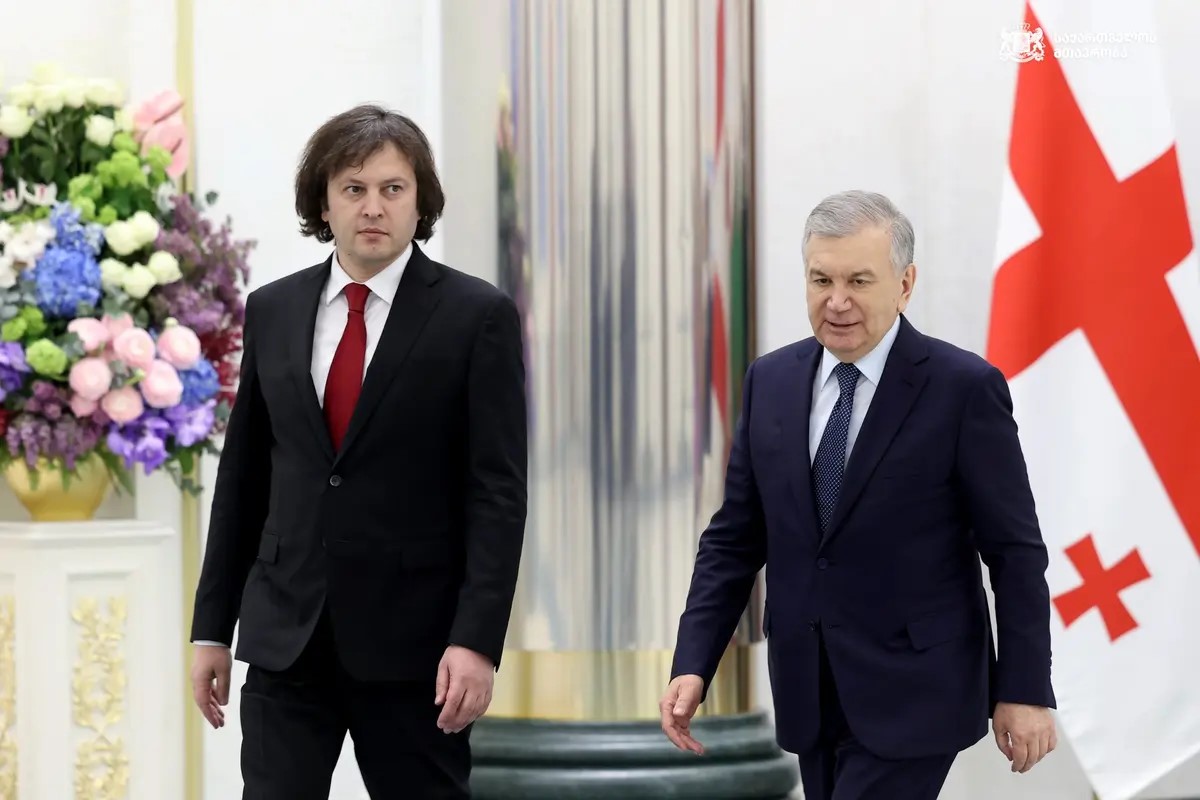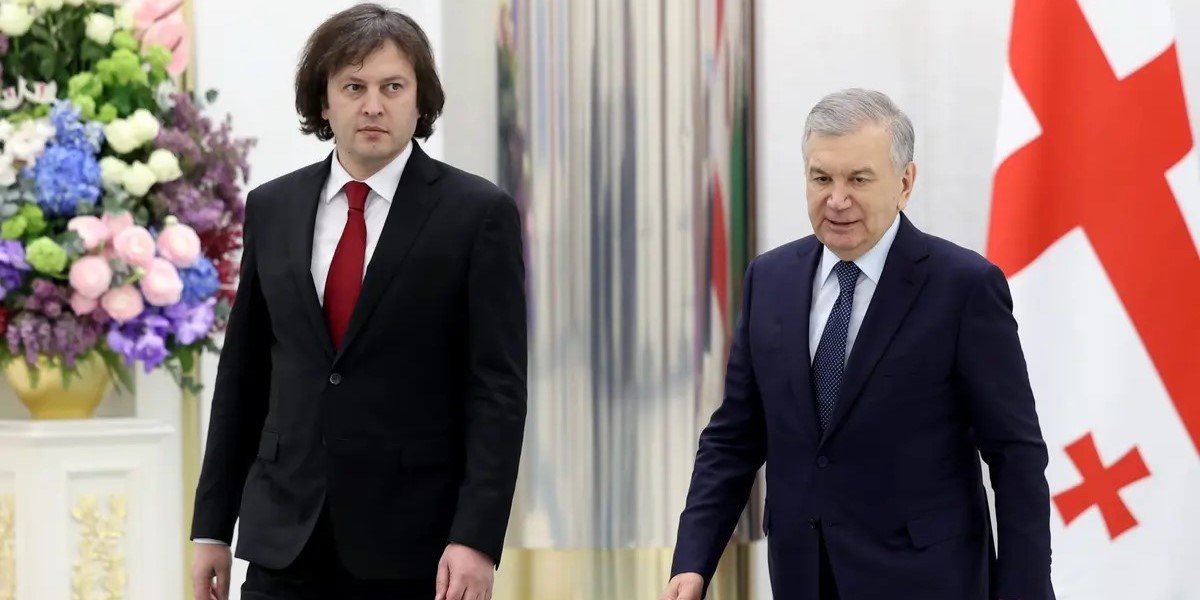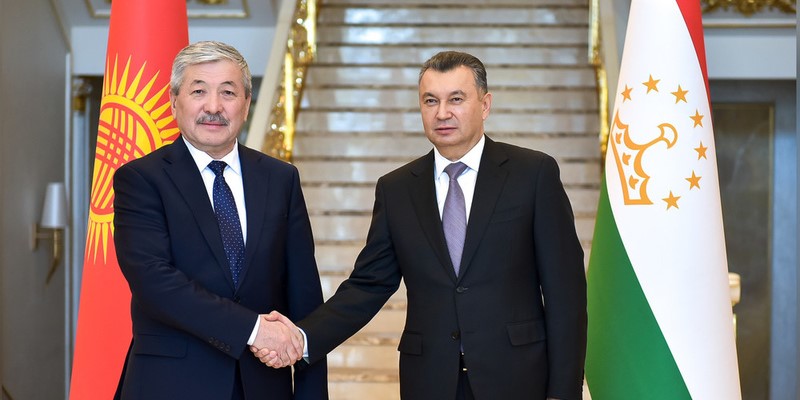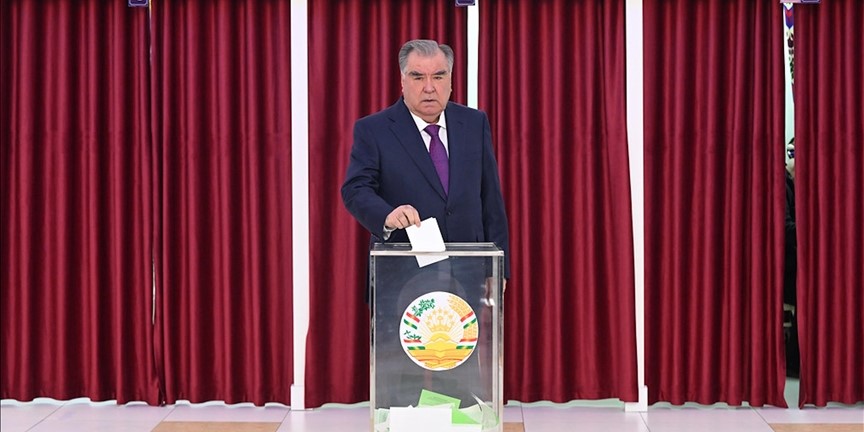Last week, the media in the region reported on several critical investment and trade stories, such as the new cargo train service connecting Kazakhstan and Uzbekistan with India, Uzbekistan and Turkmenistan launching a free trade regime; Uzbekistan investing $2.6 billion in rare earth minerals, and Kazakhstan building a $1.35 billion fertilizer production facility. They also reported on numerous energy stories, including the surge in Kazakhstani oil production and Eni’s withdrawal from several offshore projects in Kazakhstan. Multiple outlets also reported on various diplomatic visits, such as the Kyrgyzstani PM’s visits to Tajikistan and Vietnam, the Kazakhstani PM’s visit to Azerbaijan, and the Georgian PM’s visit to Tashkent. Other sources also covered the inflation situation across the region.

Georgian PM Irakli Kobakhidze visited Tashkent last week. Source: Gazeta.uz
Energy
Kazakhstan’s crude oil production rose by 15.5% to 1.83 million barrels per day in February (Daryo). Including gas condensate, production rose by 13% to 2.12 million barrels. Therefore, the country once again exceeded its OPEC+ quota. Kazakhstan’s current OPEC+ quota stands at 1.468 million barrels. The overall increase has been attributed to the surge in production at the Tengiz oil field following the completion of maintenance work and progress on the ongoing expansion project. Production at the field rose from 640000 barrels in January to 904000 barrels in February. The Kazakhstani government has pledged to compensate for any previous overproduction in the coming months. Despite Kazakhstan’s failure to adhere to its OPEC+ quota, Kazakhstan’s Energy Minister, Almassadam Satkaliyev, stated that the country took all necessary measures to fulfill its OPEC+ obligations in February (The Astana Times). Moreover, he reiterated that they would submit an updated compensation plan for all excess production recorded since January 2024. At the same time, the Vice Minister of Energy, Alibek Zhamauov, confirmed that oil production would be reduced in March (Kazinform). He added that shipments through the CPC would also fall by 70%. This follows news of a drone attack on the CPC pipeline, which transports 80% of Kazakhstan’s oil exports, on February 25. However, any decrease could be temporary as OPEC member states will begin increasing production in April to stabilise the global market. However, a sharp drop in prices could derail these plans (Kazinform).
Nevertheless, Kazakhstan’s Ministry of Energy announced its 2025 plan for the energy sector last week (Kursiv). In 2025, they aim to raise oil production from 87.7 million tons to 96.2 million, driven by projects such as the Tengiz expansion mentioned above. They will also increase oil exports from 68.6 million tons to 70.5 million. In addition, they seek to increase gas production from 59 billion cubic meters to 62.8 billion, adding new processing facilities at the Kashagan, Zhanaozen, and Barhannya fields. Last week, Iskaziyev Kurmangazy, First Deputy Chairman of the Board of KazMunayGas, also announced that Kazakhstan aims to increase oil shipments along the Aktau-Baku-Ceyhan route to 1.7 million tons this year (Kazinform). The volumes transported along the route rose 27% last year to 1.4 million tons. Overall, Kazakhstan exported 83.5 million tons of oil last year.
The Italian multinational energy company Eni has notified the Kazakhstani government that it will withdraw from the Isatay and Abay offshore projects in the Caspian Sea (Kursiv). This decision follows extensive geological and feasibility studies, which deemed the fields commercially unviable. Previously, Eni established the joint venture Isatay Operating Company with KazMunayGas in 2017 to develop the fields. This news comes after President Tokayev instructed his government to seek better terms from international energy corporations. The Kazakhstani government has also fined several companies for damaging state property. In response, several companies have accused the Kazakhstani government of “resource nationalism.”
Kazakhstan’s Ministry of Energy reported that it requires more time to complete a feasibility study of a possible oil pipeline under the Caspian Sea to Azerbaijan (Kursiv). As noted above, Kazakhstan plans to increase oil production and exports. However, there are doubts about whether the existing pipeline network can handle the expected rise in exports. As a result, Kazakhstan is exploring other options, such as the Trans Caspian International Transport Route (TITR). In 2024, KazTransOil shipped 1.419 million tons of oil from Aktau to Baku, up from 1.392 million in 2023. In 2025, they plan to export 3.6 million tons through the port of Aktau, which includes 1.7 million tons to be shipped along the Baku-Tbilisi-Ceyhan pipeline.
Inflation
Annualized inflation in Uzbekistan reached 10.13% in February, an increase of 1.78% compared to the same time last year (Kun). Meanwhile, monthly inflation rose to 0.54% in comparison to 0.32% in February 2024. The steepest increases were recorded in food, propane, and airline and railway ticket prices. Additionally, Uzbekistan’s Ministry of Finance reported that the country’s national debt reached $40.2 billion or 35% of GDP last year (Kun). According to government plans, the national debt will increase by $5.5 billion this year, although the legal annual limit is $7.3 billion. While they did not specify the composition or the interest rates on the loans, they did outline that external debt amounted to $33.7 billion and internal $6.5 billion. Out of the external debt, they raised $17.9 billion at a fixed rate and $15.64 billion at a variable rate. Meanwhile, out of the internal debt, $5.1 billion was raised at a fixed rate and $1.5 billion at a variable rate.
Inflation also remains an issue in Kazakhstan. Last week, the National Bank raised its benchmark interest rate from 15.25% to 16.5% due to skyrocketing inflation (Kursiv). In February, annualised inflation rose to 9.4%. Moreover, the National Bank also increased its inflation outlook for the coming years. In 2025, they expect inflation to surge to 10-12%, while in 2026, they anticipate it to be between 9-11%. In addition, they revised their economic growth projections downward. They believe GDP growth will be between 4.2-5.2% in 2025 and 2026. Overall, the National Bank justified its decision by citing reforms in utility and fuel prices, high global food prices, and rising inflation across Russia and developed economies.
Diplomatic Events:
Georgian Prime Minister Irakli Kobakhidze visited Tashkent on March 4-5 (Gazeta.uz). During his visit, he held talks with his Uzbekistani counterpart, Abdulla Aripov. They discussed the development of the Middle Corridor, the strengthening of trade and economic ties, increasing investment projects, and improving transport and logistics. In 2024, trade between the two countries rose 1.5 times from $222.3 million to $325.7 million. The Prime Ministers agreed to fully implement the previously signed free trade agreement to increase bilateral trade turnover to $1 billion annually. After the 10th meeting of the Intergovernmental Commission on Economic Cooperation, they signed an MoU on public procurement and a roadmap for agricultural cooperation. Prime Minister Kobakhidze also met with President Mirziyoyev. They elaborated on several areas, including digitalisation, tourism, and finance. Both praised the establishment of a digital bank in Uzbekistan with the help of Georgian investors like TBC Bank. They also resolved to increase cooperation, investment, and joint ventures.

Georgian PM Irakli Kobakhidze visited Tashkent last week. Source: Gazeta.uz
Kyrgyzstani Prime Minister Adylbek Kasymaliev paid a working visit to Tajikistan on March 4 (24.kg). During his brief visit, he met his Tajikistani counterpart, Kohir Rasulzoda. They discussed expanding cooperation across a variety of areas, including trade, tourism, and energy, as well as the upcoming trilateral summit of the Presidents of Tajikistan, Kyrgyzstan, and Uzbekistan. Both leaders reviewed several projects, including CASA-1000 (24.kg). They examined the possibility of creating an intergovernmental council and increasing trade to $500 million annually (24.kg). Bilateral trade plummeted during the 2021 and 2022 conflicts. In 2023, trade turnover decreased to $12 million, compared to $37 million in 2020. Prime Minister Kasymaliev also visited the Rogun hydroelectric power plant (HPP) to explore Tajikistan’s experience developing large hydropower projects (24.kg). He stated that studying the technologies and methods used in the construction of Rogun would help construct similar significant HPPs in Kyrgyzstan, such as the Kambar-Ata 1 project. Lastly, they announced the resumption of direct flights between the two countries following their deliberations (24.kg).

Kyrgyzstani PM Adylbek Kasymaliev visited Tajikistan last week. Source: 24.Kg
Last week, Prime Minister Kasymaliev also visited Vietnam (24.kg). He held talks with Vietnamese Prime Minister Pham Minh Chinh, and they discussed collaboration in trade, investment, energy, education, tourism, and agriculture. Prime Minister Kasymaliev noted that between 2019 and 2024, bilateral trade increased 13 times. He also suggested that both countries establish an intergovernmental council and sign agreements on investment promotion and double taxation avoidance. After their discussions, both leaders signed a number of agreements concerning education, legal, and aviation cooperation (24.kg). Prime Minister Kasymaliev also met the Chairman of the National Assembly of Vietnam, Tran Thanh Man, to explore the development of inter-parliamentary cooperation (24.kg). During a meeting with President Luong Cuong, he conveyed an invitation from President Japarov to visit Kyrgyzstan. President Luong Cuong expressed his support for Kyrgyzstan’s “Mountain agenda” and Kyrgyzstan’s candidacy for a non-permanent seat on the UN Security Council in 2027-2028. He also met with the General Secretary of the Central Committee of the Communist Party of Vietnam, To Lam, before visiting several historical sites, including Ho Chi Minh’s Mausoleum.
Kazakhstani Prime Minister Olzhas Bektenov visited Azerbaijan last week (Daryo). During talks with Azerbaijani President Ilham Aliyev and Prime Minister Alis Asadov, he noted that trade between both countries had grown to $533 million last year and that he hoped to increase non-commodity exports to Azerbaijan to $323 million. The leaders also discussed enhancing trade, energy projects, such as the green energy corridor, and transport connections, particularly the Trans-Caspian International Transport Route (TITR). The cargo transported along this route increased 62% to 4.5 million tons in the past year. They confirmed that both countries’ railways had integrated the Digital Trade Corridor platform to improve the efficiency of cross-border trade. Both sides also concluded an agreement to construct a fiber-optic cable under the Caspian Sea.
Elections
On March 2, Tajikistan held parliamentary elections (The Times of Central Asia). The Chairman of Tajikistan’s Central Commission for Elections and Referenda, Bakhtiyor Khudoyorzoda, announced the preliminary results. She stated that turnout was 85.3%, with 4.71 million out of 5.52 million registered voters participating in the election. The ruling People’s Democratic Party of Tajikistan won 51.9%, the Agrarian Party 21%, the Economic Reform Party 12.7%, the Socialist Party 5.3%, the Democratic Party 5.1%, and the Communist Party 1.3%. Thus, the Communist Party failed to meet the 5% threshold for representation in the Majlisi Oli, Tajikistan’s parliament. On February 6, the OSCE, for the first time,e cancelled its mission to observe and certify the elections as the Tajikistani authorities refused to accredit them. An observer mission from the SCO classified the elections as “transparent, credible and democratic.”

Tajikistan held parliamentary elections last weekend. Source: Amu TV
Trade
Uzbekistan’s Uztemiryulkonteyner, Turkmenistan’s TULM, and Kazakhstan’s Kedentransservice have launched a new container train service connecting Kazakhstan, Uzbekistan, and India (Daryo). The first train of 12 twenty-foot containers departed the Indian port of Mudra before traveling through Pakistan, Iran, Turkmenistan, and Uzbekistan to Sorokovaya station in Kazakhstan. Overall, the initiative aims to improve connectivity between Central and South Asia, strengthen trade ties, and increase opportunities for importers and exporters. Through its “Connect Central Asia” policy, India seeks to expand its trade and connectivity with Central Asia and Eurasia as a whole. In recent years, India has invested in Iran’s Chandar Port and the Turkmenistan, Afghanistan, Pakistan, India (TAPI) pipeline. Currently, India’s annual trade turnover with Central Asia amounts to $2 billion, compared to China’s $100 billion.
Uzbekistan’s Ambassador to Kazakhstan, Bakhtiyor Ibragimov, confirmed that Uzbekistan will establish four new trade corridors with Kazakhstan during a meeting with entrepreneurs in the Zhetysu region (UZ Daily). The initiative is part of Uzbekistan’s ongoing efforts to bolster trade and logistics between their countries. For instance, he highlighted that the Uzbekistani side is reconstructing border checkpoints in the Tashkent region. Both sides have also suggested opening trade centres in each other’s capitals. Last year, bilateral trade reached $4.2 billion.
As of February 25, Uzbekistan and Turkmenistan have officially established a free trade regime (Daryo). The establishment of a free trade regime between the countries follows the signing of an agreement on long-term trade and economic cooperation in July 2024 and the recent implementation of the Protocol on Exemptions from the Free Trade Regime. In 2024, trade between Uzbekistan and Turkmenistan reached $1.14 billion, an increase of 5.5% compared to 2023. Under the new regime, Turkmenistan has removed a range of customs duties on Uzbekistani exports to Turkmenistan, including cement, textiles, furniture, glassware, water heaters, plastic products, and meat. The Ministry of Investment, Industry, and Trade of Uzbekistan has also launched a mechanism to enable businesses to use the new arrangement effectively. Overall, this new free trade regime will significantly increase trade between the two countries.
Investment
On March 4, during a meeting between Prime Minister Olzhas Bektenov and ESTA Construction CEO Mustafa Toprak, it was revealed that Kazakhstan plans to construct a $1.35 billion chemical plant to produce 700,000 tonnes of urea and 42,000 tonnes of ammonia annually (The Astana Times). They plan to build the plant near the Kuryk port in the Mangystau region. They also expect the plant to create 400 permanent jobs. Prime Minister Bektenov noted that the project would reduce Kazakhstan’s reliance on imported fertilisers, improving the country’s food security. Currently, Kazakhstan’s agricultural sector requires 3.2 million tons of fertilizer annually. However, domestic production only amounts to 1.8 million tons or 56% of what is needed. Bektenov also said that Kazakhstan will invest $1.4 billion to support farmers this year. Last week, the Ministry of Agriculture also revealed that between September and February, Kazakhstan exported 5.8 million tons of grain, an increase of 53% compared to the same period in 2023-2024 (KazTAG).
At a government meeting on March 4, Deputy Prime Minister and Minister of National Economy Serik Zhumangarin reported that Kazakhstan would spend $1.7 billion to support small and medium-sized enterprises (SMEs) in 2025 (The Astana Times). With these funds, the government intends to set up two new guarantee funds, one of which will provide loan guarantees and interest rate subsidies to SMEs. The other fund will similarly support larger businesses. The government also envisages spending $3 billion on 190 projects to support the manufacturing sector in 2025. Meanwhile, private investors and developmental finance institutions will finance 490 projects valued at $30.6 billion this year.
Rare Minerals
On March 7, Uzbekistani President Shavkat Mirziyoyev attended a meeting on developing the rare mineral industry in Uzbekistan (Kun). Uzbekistan will invest $2.6 billion in 76 rare mineral projects over the next three years. In recent years, Uzbekistan has identified deposits of over 30 rare metals, including tungsten, molybdenum, magnesium, lithium, germanium, graphite, vanadium, and titanium. The Minister of Mining Industry and Geology, Bobur Islamov, outlined the new organisational framework for the sector and the government’s current efforts to expand the rare mineral base for industry and produce high-value-added products. He also confirmed that the government would commit more funds to geological exploration and research. Additionally, the minister highlighted that 18 projects will focus on processing and enriching the extracted minerals. For instance, he noted that enriching the tungsten from the Ingichka deposit could double its value. To facilitate these efforts, technoparks will be built in Samarkand and Tashkent regions, which are rich in molybdenum and tungsten. President Mirziyoyev also remarked that the sector receives the necessary expertise and technologies and instructed the government to set up training centers and laboratories.
One of Kazakhstan’s principal mining companies, Kazakhmys, has been forced to deny selling its deposits to foreign investors (Kursiv). Their denial comes after rumours circulated online that the company intended to sell eight of its deposits to a foreign entity. Kazakhmys’ parent company, Kazakhmys Holdings Limited, is registered at the Astana International Financial Centre. The parent company is controlled by Kazakhstani citizens Vladimir Kim and Eduard Ogay, who have a 70% and 30% stake in the company.
Sanctions
Kazakhstan’s National Bank has confirmed that no Kazakhstani banks are using the Bank of Russia’s System for Transfer of Financial Messages (SPFS), Russia’s alternative to the SWIFT system (Kursiv). Previously, it was reported that Kazakhstan’s National Payment Corporation (KNPC), a subsidiary of the National Bank that handled payments between banks, cooperated with the SPFS system through the BMS messaging system. However, the EU recently approved its 16th package of sanctions against Russia, which prohibits financial institutions from cooperating with the SPFS system.

